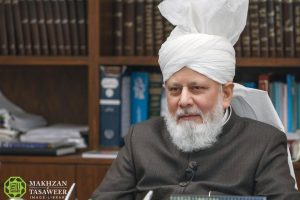
And the Jews say, ‘The Christians stand on nothing;’ and the Christians say, ‘The Jews stand on nothing;’ while they both read the same Book. Even thus said those who had no knowledge, like what they say. But Allah shall judge between them on the Day of Resurrection concerning that wherein they disagree.[i]
No matter the religion, Islam teaches that there is good in all faiths. Yet, while presenting the example of those Jews and Christians who discredit one another on the basis of their own beliefs, the Holy Qur’an presents a reality which holds true to this very day – ‘Even thus said those who had no knowledge, like what they say’ – there are those who, despite reading the same scripture, seek to condemn one another in order to establish the superiority of their own views.
But the Qur’an says that those who say such things are like ‘those who had no knowledge,’ because at the end of the day – or life for that matter – ‘Allah shall judge between them on the Day of Resurrection concerning that wherein they disagree.’
It’s a simple concept; we as people do not have the capacity, consequently the right to ultimately judge another person and the faith which they follow – and this is being taught by Islam, the very religion which claims to present the ultimate treasure of truth. Our responsibility is to present the truth given to us, and then leave the rest up to God. It’s not up to us to punish or reward based on the reaction to the truth which we present, in fact not even the Holy Prophet (sa) did so. He was simply commanded:
‘Admonish therefore, for thou art but an admonisher. Thou art not appointed a warden over them.’[ii]
Thus, so far as it pertained to who is a Muslims by the standards of the religion revealed to him by God, the Holy Prophet (sa) had a simple rule:
‘Whoever prays like us and faces our Qibla and eats our slaughtered animals is a Muslim and is under Allah’s and His Apostle’s protection. So do not betray Allah by betraying those who are in His protection.’[iii]
So the matter is clear…right? You’d think it is, but unfortunately, majority of Muslims led by their clerics have decided – despite the very clear teachings of Islam – to take matters into their own hands. There are those who have seemingly dedicated all of their worldly and ‘spiritual’ efforts towards condemning the Ahmadiyya Muslim Community and its founder, Hazrat Mirza Ghulam Ahmad (as) to falsehood and declaring him and everyone who follows him to be non-Muslim.
The basis for this is the claim that the Ahmadiyya Muslim Community is a divergent faction in Islam, as Hazrat Mirza Ghulam Ahmad (as) has dishonored the Holy Prophet (sa) by contradicting the finality of his prophethood (God forbid!)
The solution to this is simple, and does not require one to delve into a debate of doctrinal intricacies. God Almighty commanded the Holy Prophet (sa):
‘Say, ‘If you love Allah, follow me: then will Allah love you’’[iv]
Simple, clear-cut, no two ways about it. Now, what does Hazrat Mirza Ghulam Ahmad (as) say?:
‘If it is asked that the Holy Prophet, peace and blessings of Allah be on him, being Khataman Nabiyyeen (the seal of prophets), how can any other prophet arise after him…All windows of prophethood are now closed except the window of complete obedience to the Holy Prophet. Therefore, he who approaches God through this window is reflectively clothed with the same cloak of prophethood which is the cloak of the Muhammadi prophethood. The prophethood of such a one is not apart and distinct from the prophethood of the Holy Prophet (sa), inasmuch as he does not claim it in his own right but receives everything from the fountain of the Holy Prophet (sa), not for himself but for his glory.’[v]
He did not represent himself, rather he regarded himself solely as a reflection of his true master:
‘One who completely annihilates himself for his master is bestowed with the title of Nabi [Prophet] by God. Such a one does not break the seal of prophethood. When you look into a mirror, although there seems to be two, in reality there is only one. The distinction exists between that which is real and its reflection. Such is the will of God with respect to the Promised Messiah.’[vi]
My prophethood is a reflection of the prophethood of the Holy Prophet (sa) and is not a prophethood in its own right. That is why, both in the hadith and in my revelation, as I have been called a prophet, I have also been called a follower of the Holy Prophet (sa) so that it should be clear that every excellence that has been bestowed upon me has been bestowed through my following the Holy Prophet (sa) and through my obedience to him.[vii]
And so, whatever connection Hazrat Mirza Ghulam Ahmad (as) had with God, whatever he was bestowed, he attributed it to one thing:
‘Had I not been a follower of the Holy Prophet, peace and blessings of Allah be upon him, and had not obeyed him, then even if my good deeds had reached the tops of mountains, I would not have been honored with the converse of God.[viii]
Not only did he ‘pray like us’ and ‘face our Qibla’ and ‘eat our slaughtered animals’ (i.e. not only was he a Muslim) but Hazrat Mirza Ghulam Ahmad (as) obeyed – rather sacrificed his being for the Holy Prophet (sa):
After God, I am fully intoxicated in the love of Muhammad (sa)
If this is considered disbelief, then by God I am a firm disbeliever.[ix]
The sad reality is that he and his followers are labelled as disbelievers, by those who claim to do so out of their love for the Holy Prophet (sa). But do they forget the pain of the Holy Prophet (sa) when he asked a Muslim who had killed a non-Muslim on the field of battle who had professed to being a Muslim, thinking it was only for fear of death, ‘Did you tear his heart in order to find out whether it had professed or not?’[x] This was in the case of a person who had spent his entire life in disbelief, save his last few moments. Then what of Hazrat Mirza Ghulam Ahmad (as) who spent his entire life in service and devotion to God and His Messenger (sa), not deviating from his path in the slightest.
Knowing this, how can one declare someone who calls themselves Muslim, to be non-Muslim of their own accord, yet say they are doing so for the sake of the Holy Prophet (sa) in the same breath? They say they love the Holy Prophet (sa), but their actions do not reflect his teachings. All that can be said to them is:
‘Why do you say what you do not do? Most hateful is it in the sight of Allah that you say what you do not do.’[xi]
So to all those who level edicts of disbelief and declare Ahmadis to be non-Muslims, the simple question is asked:
‘Do you know better or Allah?’[xii]
[i]The Holy Qur’an Chapter 2 Verse 114
[ii]The Holy Qur’an Chapter 88 Verses 22-23
[iii]Sahih al Bukhari, Hadith 391
[iv]The Holy Qur’an Chapter 3 Verse 32
[v]AIk Ghalti ka Izala (A Misconception Removed)Ruhani Khaza’in Vol 18 pp. 207-208
[vi]Noah’s Arc p. 26
[vii]Haqeeqatul Wahi, p. 150
[viii]Tajalliat Ilahiyah, p. 24
[ix]Izala Auhamp. 176
[x]Sahih Muslim, Hadith 96 a
[xi]The Holy Qur’an Chapter 61 Verses 3-4
[xii]The Holy Qur’an Chapter 2 Verse 141




Add Comment